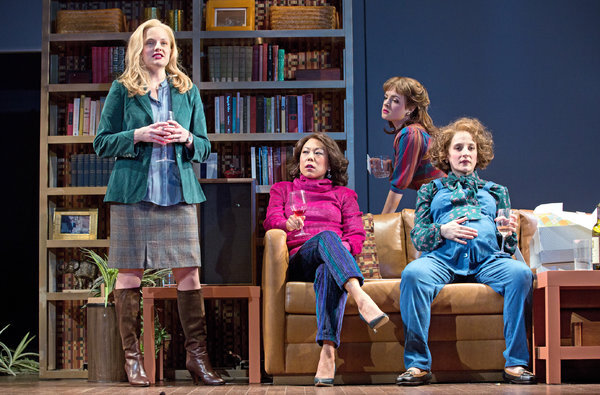The Heidi Chronicles
It is both enlightening and depressing how relevant The Heidi Chronicles still is, more than a decade after its premiere on Broadway. Wendy Wasserstein’s look at the life of feminist art historian Heidi Holland is receiving its first Broadway revival at the Music Box Theatre, and the Tony and Pulitzer Prize-winning play is speaking to a new generation with just as strong a voice.
Elisabeth Moss stars as the title character, an ambitious young woman moving through turbulent political and social change while fighting for equality within the arts. Moss, known for her performance on “Mad Men” as ambitious advertising executive Peggy Olsen, brings a beautiful vulnerability to the part, clearly embodying Heidi’s internal conflicts as she watches her friends moving in different directions than her.
Heidi is joined on her journey by Peter Patrone, her best friend who comes out to her in a particularly moving scene, and Scoop Rosenbaum, the bad boy she can’t move beyond. Peter is played by Bryce Pinkham in a particularly moving performance, embodying the hyperarticulate speech patterns of the time while also conveying the vulnerability underneath Peter’s polished and suave surface. Biggs successfully depicts Scoop’s selfishness as well as the ambivalence that holds the character back from actual fulfillment. When he explains to Heidi why he chose to marry another woman (he’d rather come home to a 6 than a 10), Biggs conveys Scoops belief in his statement while simultaneously portraying his sorrow in hurting Heidi.
The supporting cast is equally excellent, with Tracee Chimo stealing almost every scene she is in and Ali Ahn skillfully portraying the changes that Heidi's best friend Susan goes through as the years pass. The actors work well together as an ensemble; the feeling community, or lack thereof, in each scene is apparent.
One aspect of The Heidi Chronicles that struck me deeply was Heidi’s feeling of alienation from other women due to her being in a different place personally or professionally than them. In many scenes she stands on the outskirts of a crowd or the edge of the stage, depicting her sense of loneliness despite being in a crowd.The question of if a woman can “have it all,” which the play frequently asks, is addressed just as frequently in 2015. The ability of women to have a fulfilling career and personal life, and the demands that keep them from being able to do just that, is a frequent topic of discussion and debate, both politically and personally. While watching The Heidi Chronicles, I couldn’t stop wondering why the play didn’t feel more dated and wondering why it didn’t.

